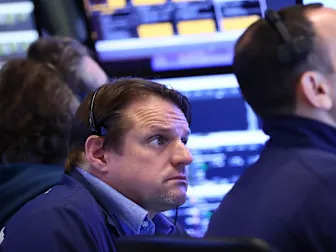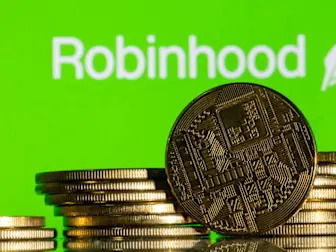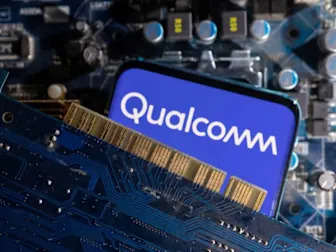The Dow Jones Industrial Average (^DJI) continues its win streak, closing 0.35% higher amid this week's economic data and Big Tech earnings. Market Domination Overtime host Julie Hyman and Yahoo Finance markets and data editor Jared Blikre weigh in on the day's market and sector moves. To watch more expert insights and analysis on the latest market action, check out more Market Domination Overtime here.
(Reuters) -Retail trading platform Robinhood's first-quarter profit more than doubled and beat analysts' estimates on Wednesday, driven by a surge in trading volumes from clients looking to hedge their positions amid choppy markets. Majority of the gains came from a 100% jump in crypto trading activity as bitcoin remained choppy during the quarter. U.S. President Donald Trump's erratic trade policy had triggered volatility across asset classes during the first three months of the year, benefiting platforms such as Robinhood by boosting trading activity.
The stock market rallied late on Wednesday to keep its winning streak alive and wrap up a chaotic month of April with some gains. The Nasdaq Composite dipped 0.1%. Both indexes are riding their longest winning streaks since last year.
Mobile chip designer Qualcomm on Wednesday forecast third-quarter revenue that would not meet estimates, joining other tech companies such as Snap and Samsung that voiced concerns about the effects of U.S. President Donald Trump's trade war. Qualcomm third-quarter estimates reflected the impact of the tariffs "as they stand today," Chief Financial Officer Akash Palkhiwala said in a conference call with analysts following the results. "We do not see any material, direct impact - there is smaller direct impact and some minor changes in demand," Palkhiwala said, in reference to the tariffs.
(Reuters) -Microsoft forecast on Wednesday stronger-than-expected quarterly growth for its cloud-computing business Azure after blowout results in the latest quarter, assuaging investor worries in an uncertain economy and lifting its shares 8% after hours. Microsoft's results, which follow similarly above-expectations outcomes from Google last week, could ease concerns about a potential slowdown in AI demand, after some analysts pointed to canceled data-center leases at Microsoft as a sign of excess capacity. Investors had also been worried about the fallout from sweeping U.S. tariffs that are prompting businesses to rein in spending.
KLA Corporation (NASDAQ: KLAC) today announced financial and operating results for its third quarter of fiscal year 2025, which ended on March 31, 2025, and reported GAAP net income of $1.09 billion and GAAP net income per diluted share of $8.16 on revenues of $3.06 billion.
Meta Platforms, Inc. (Nasdaq: META) today reported financial results for the quarter ended March 31, 2025.
Microsoft Corp. on Wednesday announced that fiscal year 2025 third-quarter financial results are available on its Investor Relations website. The direct link to the earnings press release is https://www.microsoft.com/en-us/Investor/earnings/FY-2025-Q3/press-release-webcast.
We recently published a list of Jim Cramer Says The Day “Everything’s A Lot More Expensive” Is Coming & Discusses These 10 Stocks. In this article, we are going to take a look at where CoreWeave, Inc. (NASDAQ:CRWV) stands against other stocks that Jim Cramer recently discussed. In his appearance on CNBC’s Squawk on the […]
MOUNTAIN VIEW, Calif., April 30, 2025--Confluent, Inc. (NASDAQ: CFLT), the data streaming pioneer, today announced financial results for its first quarter of 2025, ended March 31, 2025.








